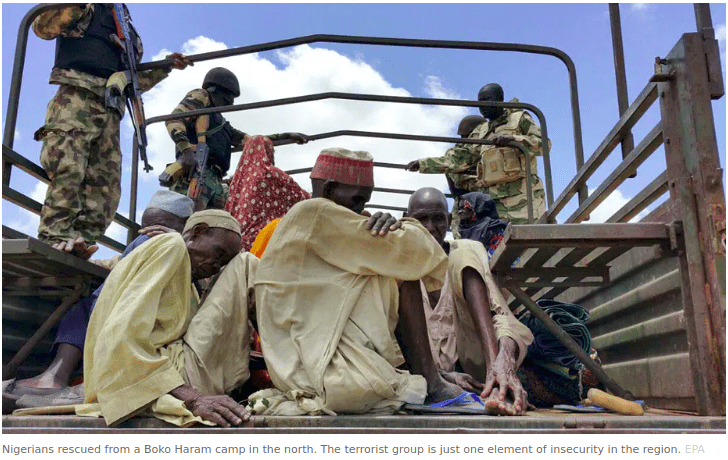National Issues
Taming the Tide: Tackling Insecurity in Nigeria -By Rukevhe Gift Oniovosa
Technology can also play a part. Utilizing drones for surveillance, improving communication networks in remote areas, and leveraging data analytics to predict crime patterns can enhance security measures. However, it’s important to ensure these technologies are used ethically and transparently to avoid infringing on civil liberties.

Insecurities have been a major problem in Nigeria for many years. They range from terrorism, banditry, and kidnapping to cultism and other forms of criminal activity. These insecurities have caused significant harm to both individuals and the country, leading to loss of lives and economic downturn. Nigeria, a nation brimming with potential, faces a formidable challenge – insecurity. From mass kidnappings to violent extremism, a sense of unease permeates many communities. While the causes are complex, a path towards a safer Nigeria exists. Here, we explore the roots of this insecurity and propose solutions for a more secure future.
One key driver is socio-economic disparity. High unemployment, particularly amongst youth, creates fertile ground for criminal recruitment. Frustration with a lack of opportunity fosters a sense of hopelessness, making some vulnerable to the allure of quick money through violence. Addressing this requires a multi-pronged approach. Investment in education and job creation programs, particularly in vocational skills and agricultural initiatives, empowers young people and offers a positive alternative to criminal activity.
Corruption also weakens the social fabric. When public funds are siphoned away, resources meant for security and social programs dwindle. This not only weakens law enforcement but also erodes public trust in institutions. Strengthening anti-corruption measures, promoting transparency, and ensuring accountability are crucial steps towards building a more secure society.
Furthermore, historical grievances and ethnic tensions can fuel violence. Boko Haram’s insurgency in the North-East exemplifies this. Fostering inter-religious and inter-ethnic dialogue, promoting a sense of national identity that celebrates diversity, and addressing underlying causes of these grievances are essential for long-term stability.
To curb these insecurities in Nigeria, the government needs to take some vital steps. Firstly, they need to invest more in security. This can be done by increasing the funding for the security agencies, which will enable them to recruit and train more personnel to increase their capacity. Also, the government can invest in technology to enhance intelligence-gathering capabilities and communication systems.
The role of security forces is also critical. A well-trained, well-equipped, and rights-respecting police force is fundamental. Community policing initiatives that build trust between officers and residents can generate valuable intelligence and foster cooperation. Additionally, improving military capabilities and intelligence gathering are necessary to combat armed groups effectively.
However, security cannot be solely the responsibility of the state. Community engagement is vital. Grassroots initiatives that promote peacebuilding, conflict resolution, and early warning systems empower communities to identify and address potential flashpoints of violence. Additionally, fostering a culture of non-violence through education and public awareness campaigns can create a societal shift towards peaceful conflict resolution.
Technology can also play a part. Utilizing drones for surveillance, improving communication networks in remote areas, and leveraging data analytics to predict crime patterns can enhance security measures. However, it’s important to ensure these technologies are used ethically and transparently to avoid infringing on civil liberties.
Finally, addressing the root causes of insecurity requires a holistic approach. Investing in healthcare, particularly mental health services, can address underlying issues that may lead individuals towards violence. Additionally, strengthening the justice system to ensure swift and fair trials promotes deterrence and upholds the rule of law.
There should be collaboration with neighboring countries to tackle insecurity in Nigeria. It is no news that the porous borders in Nigeria have been a major cause of the rise in criminal activities. The government needs to collaborate with countries like Niger, Chad, and Cameroon to strengthen their borders and checkmate the movement of criminals, weapons, and drugs.
Curbing insecurity in Nigeria is a complex challenge that necessitates a multifaceted approach. By tackling socio-economic disparities, fostering inter-group dialogue, strengthening security forces, promoting community engagement, and leveraging technology responsibly, Nigeria can build a more secure future for all its citizens. As Nigerians unite with a common purpose, the tide of insecurity can be tamed, paving the way for a more prosperous and peaceful nation.
In conclusion, insecurity is a major problem that needs to be addressed strategically to restore normalcy in Nigeria. The government, citizens, and other stakeholders must work together to detect, prevent, and combat insecurity in the country.










